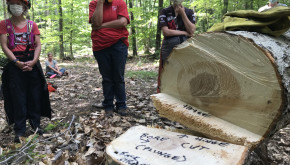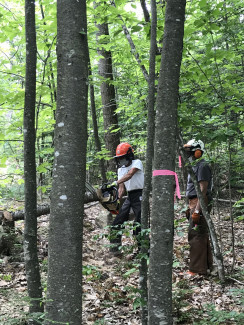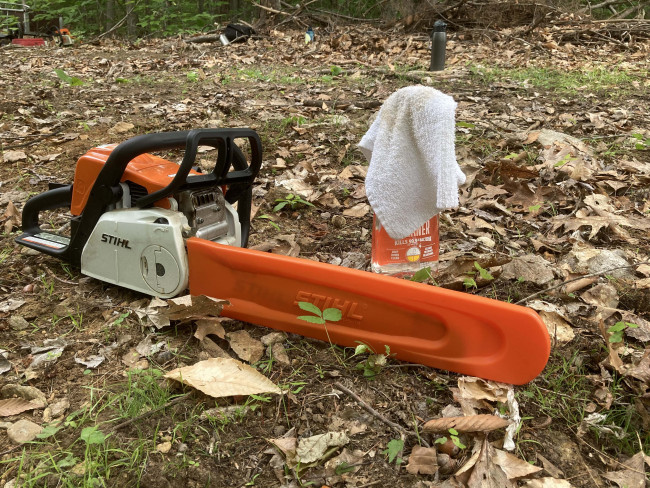
On a recent summer weekend, the intermittent sound of chainsaws running could be heard through a woodland in southern Maine, as a group of women woodland owners learned the fundamentals of safely operating a chainsaw. Interspersed through the woods, small groups of women took turns with their peers in starting a saw, cutting tree “cookies,” making bore cuts, and clearing brush. The day was warm, but the summer sun did not deter these women from donning heavy chaps and steel-toed boots, or from diligently wearing face masks—part of a COVID safety protocol that made the event possible.
The Women Owning Woodlands network is a national program, funded by the USDA Forest Service and administered by the Forest Stewards Guild, that empowers women woodland owners with resources, training, and information to become active stewards of their land. The program also brings together a network of professionals from around the country who offer outreach and education to women woodland owners. Through extension work, woods walks, annual retreats, forestry workshops, and social gatherings, these professionals provide spaces for women woodland owners to meet like-minded individuals, ask questions, and learn how to manage their land.
Whether the audience includes women who are old hands at forestry or just starting out with thinking about managing their land, these landowners feel a strong sense of value in having the opportunity to learn among peers. Together, they ask burning land management questions and forge connections with other women who think about such things as improving wildlife habitat, how to find a consulting forester, or how to successfully beat back invasive barberry.
Demand for chainsaw training among women land stewards and woodland owners is very high, as anyone knows who has planned such an event. Spots fill quickly and waitlists run long. But offering a women’s chainsaw workshop during a pandemic is new territory. How do you build a safe learning environment amidst the guidelines and limitations on gathering during the COVID pandemic? How do you make sure women have access to proper training while maintaining social distancing?
The weekend workshop in Maine was preceded by a virtual workshop, Women’s Chainsaw Safety Fundamentals, offered by the Forest Stewards Guild in partnership with University of Maine Cooperative Extension, tish carr Consulting, and the Maine Organic Farmers and Gardeners Association. This workshop was conceived to provide basic training despite the circumstances brought on by COVID-19. Over two, two-hour interactive sessions on successive Saturday mornings, participants learned about chainsaw basics such as personal protective equipment (PPE), parts of a saw, safe posture, steps to starting a saw, and safety planning.
The virtual workshop didn’t replace an in-person training—no chainsaws were started—but rather was designed to provide a foundation for in-person workshops once they were able to resume. The virtual workshop took place while most of the country was under lockdown and landowners were itching to get outdoors. Additionally, a happy side effect was that the virtual training was accessible to some participants with small children who would not have been able to travel to a weekend-long, in-person training.
Later in the summer, with more information available on how the virus spreads and fair weather facilitating outdoor gatherings, an in-person workshop was in order. Workshop leaders were very clear about the culture of safety, both regarding chainsaw use and COVID-19. Everything took a little more time and communication, and everyone was prepared to go at a slower pace to accommodate extra precautions.
The workshop leaders recognized that there was some inherent risk around gathering during the pandemic, just as there is inherent risk in using a chainsaw. Was the benefit worth the risk? Most participants were at a beginner level of chainsaw operation, and most were also intending to run a chainsaw this summer in any event, so extending training on safety practices was timely and needed.
For many participants, this was the first outside-the-house event since the start of the pandemic. In the face of so much uncertainty, it was an empowering experience to learn practical land management skills in a women-focused learning environment.
These chainsaw workshops illustrate just one of the many ways that communities of women woodland owners around the country have been adapting during the pandemic. North Carolina’s ForestHer group has offered a virtual chainsaw safety class and webinars for women landowners. In August, a group of women woodland owners and natural resource professionals gathered at a lake in Wisconsin to paddle together while learning about forest stewardship. On the virtual front, the University of Minnesota Extension’s Master Naturalist program uses #TrailTuesday to allow people to share short Facebook Live videos from trails and woods walks. Pennsylvania’s annual Women and their Woods retreat is going virtual this fall.
New events and ideas bubble up regularly, showing that the Women Owning Woodlands network is a resilient community that will continue to support women forest stewards through the pandemic. Together, we’ll keep growing, learning, and sharing our love for the woods!



